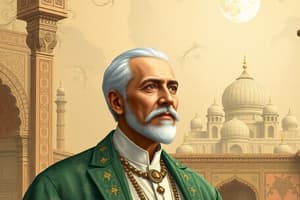Podcast
Questions and Answers
What was Muhammad Ali Jinnah's birthplace?
What was Muhammad Ali Jinnah's birthplace?
- Peshawar
- Lahore
- Karachi (correct)
- Delhi
Which organization did Jinnah initially join to advocate for Indian independence?
Which organization did Jinnah initially join to advocate for Indian independence?
- Muslim League
- Indian National Congress (correct)
- British Indian Association
- All India Muslim Conference
What was a key reason for Jinnah's advocacy for a separate Muslim state?
What was a key reason for Jinnah's advocacy for a separate Muslim state?
- Desire for international recognition
- Economic benefits
- Political alliances with British
- Cultural identity and interests (correct)
What position did Jinnah hold after the creation of Pakistan?
What position did Jinnah hold after the creation of Pakistan?
What ideology did Jinnah emphasize for the future of Pakistan?
What ideology did Jinnah emphasize for the future of Pakistan?
Which educational institution did Jinnah attend to become a barrister?
Which educational institution did Jinnah attend to become a barrister?
What was one of the major challenges Jinnah faced as the first Governor-General of Pakistan?
What was one of the major challenges Jinnah faced as the first Governor-General of Pakistan?
What aspect of society did Jinnah stress was crucial for Pakistan's development?
What aspect of society did Jinnah stress was crucial for Pakistan's development?
Flashcards
Jinnah's early political stance
Jinnah's early political stance
Muhammad Ali Jinnah's initial belief in a united India, advocating for complete independence from British rule.
Jinnah's change in ideology
Jinnah's change in ideology
The shift in Jinnah's political views, moving from a united India to supporting a separate Muslim-majority state, Pakistan.
The Muslim League's main argument for Pakistan
The Muslim League's main argument for Pakistan
The Muslim League, led by Jinnah, advocated for a separate homeland for Muslims, arguing for a distinct cultural identity and potential conflict of interests within a united India.
Jinnah's impact on Partition
Jinnah's impact on Partition
Signup and view all the flashcards
Jinnah's challenges as Pakistan's first leader
Jinnah's challenges as Pakistan's first leader
Signup and view all the flashcards
Jinnah's vision for Pakistan
Jinnah's vision for Pakistan
Signup and view all the flashcards
The partition of India
The partition of India
Signup and view all the flashcards
Jinnah's legacy
Jinnah's legacy
Signup and view all the flashcards
Study Notes
Early Life and Education
- Muhammad Ali Jinnah, later known as Quaid-e-Azam, was born on December 25, 1876, in Karachi, British India.
- He had a strong family background, known for their business acumen and involvement in civic life.
- Jinnah received a rigorous education, notably at the Christian Missionary School and later, the Lincoln's Inn of London, becoming a barrister.
- This early exposure to diverse communities and legal systems shaped his understanding of issues relating to law and governance.
Political Career
- Jinnah's initial political involvement was in the Indian National Congress, advocating for the complete independence of India.
- He initially favored a united India, but shifts in the political landscape led to his eventual support for a separate Muslim-majority state.
- He spearheaded the Muslim League, playing a pivotal role in its organization and strengthening its position.
- His arguments for a separate homeland were based primarily on the potential clash of interests and distinct cultural identity between Hindus and Muslims within a unified India.
Role in Partition
- Jinnah became the key figure in the demand for a separate Muslim state, Pakistan.
- He skillfully advocated for a partitioned India, navigating complex negotiations and alliances.
- His leadership was critical in gaining recognition and support for a Pakistani state.
- The partition was an emotionally charged and often violent event, with significant population displacement.
Leadership in Pakistan
- Upon the creation of Pakistan, Jinnah became its first Governor-General.
- He faced numerous challenges establishing a new nation, from economic and political issues to ensuring stability and integration.
- Jinnah emphasized the unity and integrity of the nation during his tenure.
- He urged the development of a progressive and modern Pakistan, fostering its democratic institutions.
Quaid-e-Azam's Legacy
- Jinnah's vision for Pakistan emphasized secularism and democracy.
- He stressed the importance of education, modern ideas, and industrialization.
- He is remembered as a pivotal figure in the creation of Pakistan and a prominent leader within the Indian independence movement.
- His persona was often characterized by a strong sense of purpose.
- His contribution to the establishment of Pakistan remains a significant part of modern Pakistani history.
- His speeches, ideology, and actions continue to influence the trajectory of the country.
Studying That Suits You
Use AI to generate personalized quizzes and flashcards to suit your learning preferences.
Description
Explore the fascinating journey of Muhammad Ali Jinnah, from his early life and education in Karachi to his pivotal role in shaping the political landscape of India. This quiz delves into his transformation from a proponent of a united India to the founder of Pakistan, highlighting key moments and influences in his life.




